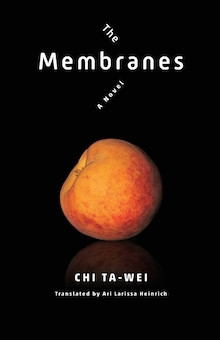
Columbia University Press, 2021
The futuristic world described in Chi Ta-wei’s The Membranes — published in 1995 in Taiwan and recently translated into English by Ari Larissa Heinrich — is an undersea civilization in the year 2100, when relentless ultraviolet rays force humankind to shelter on the ocean floor. Meanwhile, militarized cyborgs called “M units” roam the surface, where they fight wars on behalf of nation-states, which have evidently survived intact. The casually apocalyptic environmental disaster is par for the course for a dystopian novel; true to form, the real calamity is not the environmental doomsday scenario itself but how human society adapts to it. War, while bloodless, is supported by the pervasion of the military-industrial complex. Everybody is lonely and a workaholic, including the protagonist, Momo, a premier “dermal care technician” who employs cutting-edge devices to maintain her clients’ skin quality.
Although life on Chi’s version of Earth is thoroughly corporatized and militarized, it is not wholly repressive. In particular, heteronormativity has been dethroned, and queerness abounds. Because Chi tends toward elaborate world-building — a detailed explanation of events leading to humanity’s migration underwater only reminded me that I was resolutely not in Momo’s world — the ubiquitous queerness is strikingly unaccounted for. This minimalist approach to queer desire renders it the most compelling feature of Chi’s speculative universe. Momo’s mother tells Momo that she burst into existence when her mother split a peach with a female friend. Momo recognizes that this is just a story; nevertheless, she takes it seriously. Chi narrates Momo’s delight in being presented with a non-normative origin story: “It was the twenty-second century, and Momo had a basic understanding of sex. But she liked that it was at least unique. So… why not choose to believe it?” Momo herself is deeply affected by a childhood friendship with a cyborg, for whom she longs even in adulthood. Decidedly private and averse to intimacy, Momo is a voyeur when it comes to human touch: She applies a secret layer to her clients’ skin that records tactile data, occasionally then replaying those sensations on her own body.
What might Chi be saying about a world in which corporations exercise unprecedented control over workers while the ideals of queer liberation and post-humanism are concurrently being manifested? A possible answer is provided by the novel’s dominant conceit: membranes. Membranes of all sorts become hotspots for ambiguity and anxiety in Momo’s world. One membrane protects human society from the ocean that surrounds it. Another — familiar human skin — requires tedious protection from natural and manmade assaults. In Chi’s world, membranes are literally and figuratively porous; gender fluidity, prosthetic organs, skin cancer, and contagious disease are all characteristic elements.
Just because essentialist categories have been jettisoned doesn’t mean that a utopian, politics-free world has arrived. Social boundaries, aided by technological advances, have become more flexible, but they have not dissolved into irrelevance. While the availability of sophisticated, cyborgian biomedical technologies allows Momo to live virus-free, this medical progress does not come without a cost. During a long stay in the hospital in her childhood, Momo is given an android friend of whom she grows quite fond. After her surgery, her friend is nowhere to be found. Only following years of grief over her friend’s disappearance does Momo learn that the cyborg was built to supply her with vital organs. Sensitive to consciousness in androids, Momo is besieged by guilt. Momo’s mother and her doctors have decided who she will be, while Momo herself is given no say. The medical resources for recombining human and cyborg are extensive in Chi’s world, but this fact does not erase the political importance of individual agency over determining one’s own hybrid identity. Post-surgery, Momo is left with the mournful sense that something is ineffably missing and that her freedom has been stolen from her, even though she cannot yet put these feelings into words.
There is danger in this kind of writing. Dystopias are thoroughly bleak; they have no appealing or redeeming features. Not even right-wing critics of feminism want to live in the Gilead of The Handmaid’s Tale. This bleakness can lull the reader into complacency: If nothing about the society portrayed resembles my political vision for the world, then I am not personally responsible for its realities, regardless of how frightful and proximate they might be. In this way, a novel that might otherwise prompt serious deliberation about one’s politics instead binds ideals so tightly to horrors that desired progress comes to seem less desirable — too costly, perhaps, or even a threat. The world of The Membranes is one where consequential new freedoms cohabitate with climate destruction, hyper-corporatization, and militarization, encouraging the reader to dream big while staying vigilant.
Despite the odd technological anachronism (“laserdiscs,” “disczines”), the world of The Membranes freshly evokes and elaborates on the philosopher Donna Haraway’s feminist and post-humanist call to abandon familiar boundaries and embrace a monstrous hybridity. It also hints that such a project is likely to produce ambiguous results. By the novel’s end, the world itself begins to appear as a monstrous cyborg, composed of competing agents and forces that nevertheless operate under a militarized and profit-seeking regime. Will the porousness of membranes abet the free play of identities? Or will it facilitate the exploitation of nation-states and capital? Likely both, Chi suggests.
+++
+
+